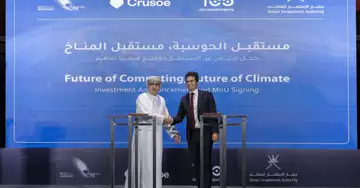Crusoe Energy, the U.S. private company that pioneered Bitcoin (BTC) mining by using wasted natural gas as an energy source, is expanding into the Middle East region with investments from Mubadala - Abu Dhabi's sovereign wealth fund - and the Oman Investment Authority (OIA).
Crusoe announced this week that the OIA and Mubadala were each part of a $350 million funding round that closed in April. "This investment will drive Crusoe's efforts to expand internationally as it works to align the future of computing with the future of climate," the company said in a statement sent to CoinDesk.
As part of the expansion, the Denver-based miner will first open an office in Oman's capital, Muscat, and shortly thereafter in Abu Dhabi. Crusoe will initially hire two or three employees for the offices and about eight field employees, CEO and co-founder Chase Lochmiller told CoinDesk. Lochmiller expects to have pilot-level technologies deployed at a location in each country by the first quarter of 2023.
While he did not comment on the level of investment by the two countries, Lochmiller acknowledged that the deployments are "significant." The expansion of Crusoe's patented digital flaring systems establishes the company as the first flare gas bitcoin miner in the Middle East and North Africa (MENA) region, he added.
Crusoe currently has several mobile sites in the U.S. and a customer list that includes energy producers such as Devon Energy (DVN), Kraken Oil & Gas, Canada-based Enerplus (ERF) and perhaps Exxon (XOM), where Crusoe is reportedly working on a pilot project to use flare gas for bitcoin mining at the energy giant's North Dakota oil wells.
"A global problem"
Flaring is the process of flaring excess natural gas into the atmosphere as part of oil drilling operations. Because of the lack of transportation infrastructure, this has become common practice in the industry. However, the process is under scrutiny from an environmental perspective, and U.S. President Joe Biden has pledged to reduce methane emissions from oil and gas operations.
It's not just a problem in the U.S., it's a global problem with global implications," Lochmiller said. His company noted that the MENA region accounted for more than 38% of global flaring in 2020. Oman accounted for about 1.8%, or 2,517 million cubic meters, of this emission, while the United Arab Emirates was responsible for about 0.7%, or 955 million cubic meters.
Using this otherwise wasted exhaust to mine digital assets has become a popular trend in both the crypto and energy industries.
"We are excited to expand our digital flare mitigation technology to the Middle East to solve the region's long-standing flaring problems while enabling a new generation of digital technology in the region," Lochmiller said. "Both OIA and Mubadala have recognized the value of Crusoe's digital flaring technology and how it can provide a flexible mechanism to reduce emissions and attract new technology-driven industries to the country," he added.
We hope that these two sites can serve as a starting point for further expansion into other countries in the region," Lochmiller added, noting that Oman and Abu Dhabi's MENA neighbors - including Saudi Arabia - face similar challenges.

